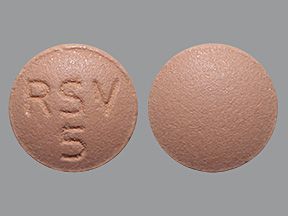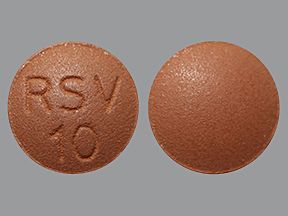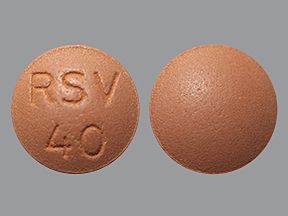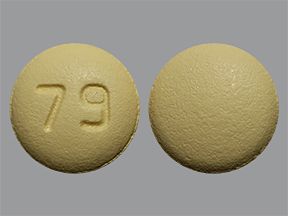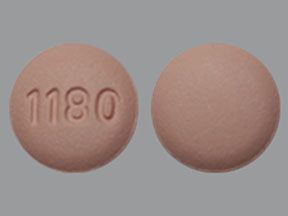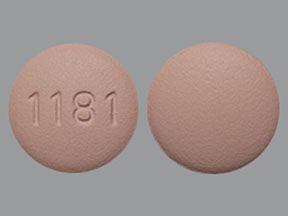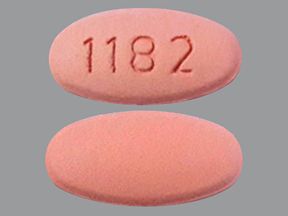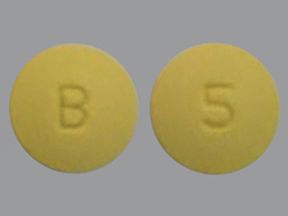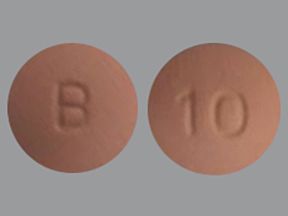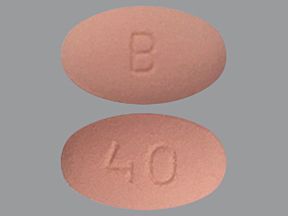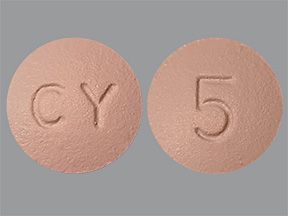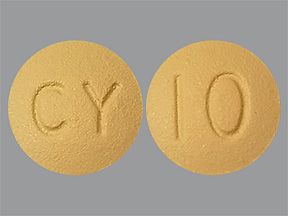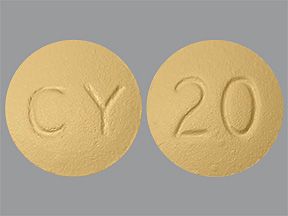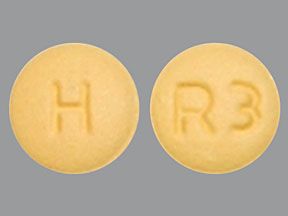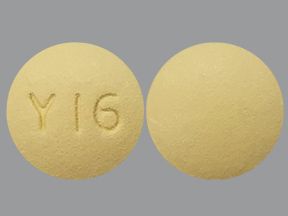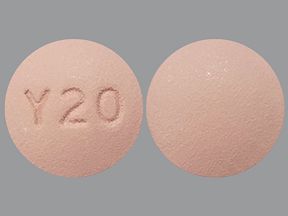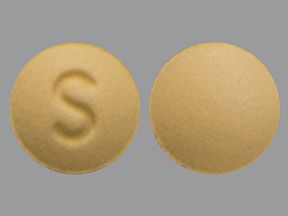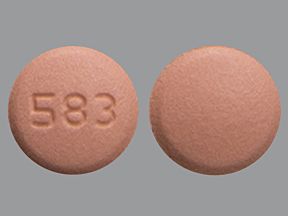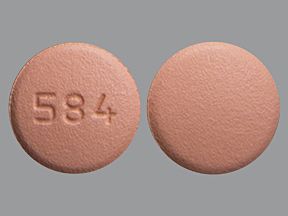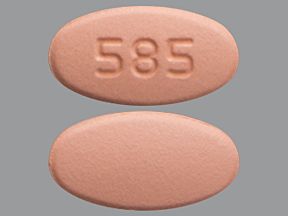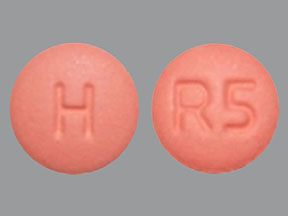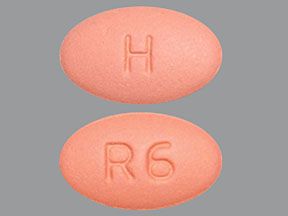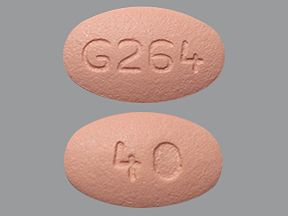Rosuvastatin is an oral tablet that’s prescribed for lowering cholesterol and triglyceride levels to help treat certain conditions. This generic medication is also available as the brand-name drug Crestor. Rosuvastatin belongs to the statin drug class.
Rosuvastatin is FDA-approved for use in adults in certain situations:
- treating specific types of high cholesterol and high triglycerides
- lowering the risk of cardiovascular disease and related death, and reducing the need for certain types of heart surgery
- slowing the progression of a condition called atherosclerosis
In some cases, rosuvastatin may also be used to treat high cholesterol in certain children.
For details on the drug’s uses, as well as its limitations of use, see the “Rosuvastatin uses” section below.
Rosuvastatin comes as oral tablets. It also comes as oral capsules, which are available as the brand-name drug Ezallor Sprinkle. (The capsules don’t come as a generic medication.) This article addresses only the tablets. For information on rosuvastatin’s other form, talk with your doctor or pharmacist.
Generic rosuvastatin oral tablets are available in a brand-name form called Crestor.
Rosuvastatin oral tablets are a generic drug. A generic drug is an exact copy of the active drug in a brand-name medication. Crestor is the brand-name medication that rosuvastatin oral tablets are based on. A generic is considered to be as safe and effective as the original drug. Generics tend to cost less than brand-name drugs.
If you’re interested in using Crestor tablets instead of rosuvastatin oral tablets, talk with your doctor. They can tell you if Crestor tablets come in strengths that can be used for your condition. If you have insurance, you’ll also need to check whether your plan will cover Crestor tablets.
To learn more about how generics compare with brand-name drugs, see this article.
Rosuvastatin oral tablets can cause mild or serious side effects. The following lists contain some of the key side effects that may occur while taking rosuvastatin oral tablets. These lists do not include all possible side effects.
For more information about the possible side effects of rosuvastatin oral tablets, talk with your doctor or pharmacist. They can give you tips on how to deal with any side effects that may be concerning or bothersome.
Note: The Food and Drug Administration (FDA) tracks side effects of drugs it has approved. If you would like to notify the FDA about a side effect you’ve had with rosuvastatin oral tablets, you can do so through MedWatch.
For a detailed overview at rosuvastatin’s side effects, refer to this article.
Mild side effects
Mild side effects* of rosuvastatin oral tablets can include:
- abdominal pain
- headache
- nausea
- weakness
- fatigue
- constipation
- joint pain*
Most of these side effects may go away within a few days or a couple of weeks. However, if they become more severe or don’t go away, talk with your doctor or pharmacist.
* This is a partial list of mild side effects from rosuvastatin oral tablets. To learn about other mild side effects, talk with your doctor or pharmacist, or refer to the prescribing information for rosuvastatin oral tablets.
Serious side effects
Serious side effects from rosuvastatin oral tablets aren’t common, but they can occur. Call your doctor right away if you have serious side effects. Call 911 or your local emergency number if your symptoms feel life threatening or if you think you’re having a medical emergency.
Serious side effects and their symptoms can include:
- Liver problems, such as increased levels of liver enzymes (which can be a sign of liver damage). Symptoms can include:
- pain in your upper abdomen
- dark urine
- loss of appetite
- feeling weaker or more tired than usual
- Muscle pain, weakness, or tenderness.*
- Allergic reaction.*
* For more information about this side effect, see “Side effect details” below.
Side effect details
Here’s some detail on certain side effects this drug may cause.
Joint pain
Joint pain may occur with the use of rosuvastatin oral tablets. This side effect was reported in clinical trials of the drug. To find out how often this side effect occurred in clinical trials, see the drug’s prescribing information.
If you have joint pain while using rosuvastatin oral tablets, talk with your doctor. They may recommend a medication to treat it. If the pain is severe, your doctor may suggest that you switch to a drug other than rosuvastatin oral tablets.
Muscle pain, weakness, or tenderness
It’s possible to have myopathy (muscle pain, weakness, or tenderness) as a side effect of taking rosuvastatin oral tablets. However, most people who took the medication in clinical trials didn’t report these muscle side effects. To find out how often muscle problems occurred in clinical trials, see the drug’s prescribing information.
In people who do have muscle problems from taking rosuvastatin oral tablets, most experience mild muscle pain.
In rare cases, more serious muscle problems (such as rhabdomyolysis) can occur. With rhabdomyolysis, muscles die and break down, releasing substances into your blood that could cause kidney failure. Rhabdomyolysis is very rare but can be life threatening.
Symptoms of rhabdomyolysis can include:
- muscle pain, often with aches and throbbing
- muscle weakness
- swelling or inflammation in your muscles
- dark urine
- fatigue
- nausea or vomiting
- feeling confused or disoriented
If you have unexplained muscle pain, tenderness, or weakness while taking rosuvastatin oral tablets, talk with your doctor right away. In rare cases, it could be a symptom of a more serious condition, such as myopathy or rhabdomyolysis. Your doctor will likely have you stop taking the medication. They may also order tests to check for a more serious problem, especially if you’re having symptoms of rhabdomyolysis.
Who’s at risk for muscle problems
You may have an increased risk for muscle problems with rosuvastatin oral tablets if you:
- take certain medications (see the “Rosuvastatin interactions” section below for details)
- are age 65 years or older
- have untreated or unmanaged thyroid problems, such as hypothyroidism
- have kidney problems
If you’re in one of these categories, be sure to talk with your doctor. They may prescribe a lower-than-usual dose of rosuvastatin oral tablets and monitor you closely. Your doctor may also recommend a different medication for your condition.
The risk for muscle problems may also increase if you take the highest dose of rosuvastatin oral tablets: 40 milligrams (mg). This risk may increase further if you have other risk factors listed above. Before taking rosuvastatin, be sure to talk with your doctor about any medical conditions you have. This can help them determine the safest dose for you.
Allergic reactionAs with most drugs, some people can have an allergic reaction after taking rosuvastatin oral tablets. However, it’s not clear whether this side effect occurred in clinical trials.
Symptoms of a mild allergic reaction can include:
- rash
- itchiness
- flushing
A more severe allergic reaction is rare but possible. Symptoms of a severe allergic reaction can include:
- swelling under your skin, typically in your eyelids, lips, hands, or feet
- swelling of your tongue, mouth, or throat
- trouble breathing
Call your doctor right away if you have an allergic reaction to rosuvastatin oral tablets, as the reaction could become severe. Call 911 or your local emergency number if your symptoms feel life threatening or if you think you’re having a medical emergency.
The dosage of rosuvastatin oral tablets your doctor prescribes will depend on several factors. These include:
- the type and severity of the condition you’re using rosuvastatin oral tablets to treat
- other medical conditions you may have
- other medications you may take
- your genetics*
Typically, your doctor will start you on a low dosage. Then they’ll adjust it over time to reach the amount that’s right for you. Your doctor will ultimately prescribe the smallest dosage that provides the desired effect.
The following information describes dosages that are commonly used or recommended. However, be sure to take the dosage your doctor prescribes for you. Your doctor will determine the best dosage to fit your needs.
* Some people of Asian descent may metabolize (break down) rosuvastatin oral tablets differently, so they may need a lower dose of the medication.
Drug strengths (5 mg, 10 mg, 20 mg, 40 mg)
Rosuvastatin oral tablets are available in the following strengths: 5 milligrams (mg), 10 mg, 20 mg, and 40 mg.
Dosage for high cholesterol and high triglycerides
Rosuvastatin oral tablets are used to treat high cholesterol and high triglycerides in certain people and situations. For details, see the “Rosuvastatin uses” section below.
The dose of rosuvastatin oral tablets for treating high cholesterol and high triglycerides ranges from 5 mg to 40 mg. The starting dosage is usually 10 mg or 20 mg per day.
The maximum dosage of rosuvastatin oral tablets is 40 mg per day. This dosage should be used only if other strengths aren’t effective at helping you reach your target low-density lipoprotein (LDL) cholesterol level. (LDL cholesterol is sometimes called “bad cholesterol.”)
Both 20 mg and 40 mg are considered high-intensity doses of rosuvastatin oral tablets for treating high cholesterol and high triglycerides.
Dosage for reducing risk of cardiovascular disease
Rosuvastatin oral tablets are used to lower the risk of cardiovascular disease (CVD), including slowing the progression of atherosclerosis.
The dose of rosuvastatin oral tablets for lowering the risk of CVD ranges from 5 mg to 40 mg. The starting dosage is usually 10 mg or 20 mg per day.
The maximum dosage of rosuvastatin oral tablets is 40 mg per day. This dosage should be used only if other strengths aren’t effective at helping you reach your target low-density lipoprotein (LDL) cholesterol level. (LDL cholesterol is sometimes called “bad cholesterol.”)
Both 20 mg and 40 mg are considered high intensity doses of rosuvastatin oral tablets for lowering the risk of cardiovascular disease.
Children’s dosage
Heterozygous familial hypercholesterolemia (HeFH) is an inherited type of high cholesterol. For treating HeFH, rosuvastatin oral tablets may be used in children ages 8 to 17 years. The dosage for treating HeFH in children varies by age:
- Children ages 8 to 9 years may take 5 mg to 10 mg once per day.
- Children ages 10 to 17 years may take 5 mg to 20 mg once per day.
What if I miss a dose?
If you miss a dose of rosuvastatin, try and take your dose as soon as you remember. However, if it’s within 12 hours of your next dose, simply skip the missed dose. Then take your next dose as scheduled. Taking more than one rosuvastatin oral tablet within 12 hours may increase your risk for side effects. (For more about side effects, see the “Rosuvastatin side effects” section above.)
To help make sure that you don’t miss a dose, try using a medication reminder. This can include setting an alarm or timer on your phone or downloading a reminder app. A kitchen timer can work, too.
How long should I take rosuvastatin?
Rosuvastatin oral tablets are meant to be used as a long-term treatment. If you and your doctor determine that rosuvastatin oral tablets are safe and effective for you, you’ll likely take them long term.
Other drugs are available that may be able to treat your condition. Some may be a better fit for you than others. If you’re interested in finding an alternative to rosuvastatin oral tablets, talk with your doctor. They can tell you about other medications that may work well for you.
Note: Some of the drugs listed here are used off-label to treat these specific conditions. Off-label drug use means using a drug for a purpose other than what it’s been approved for by the Food and Drug Administration (FDA).
Alternatives for high cholesterol and triglycerides
Rosuvastatin oral tablets are used to treat high cholesterol and high triglycerides in certain people and situations. For details, see the “Rosuvastatin uses” section below.
Examples of other drugs that may be used to treat high cholesterol and triglycerides include:
- other statin drugs, such as:
- Crestor (brand-name version of rosuvastatin oral tablets)
- atorvastatin (Lipitor)
- simvastatin (Zocor)
- ezetimibe (Zetia)
- bile acid-binding resins, such as:
- cholestyramine (Prevalite)
- colesevelam (Welchol)
- colestipol (Colestid)
- fibrates, such as:
- fenofibrate (Antara, Lipofen, Tricor)
- gemfibrozil (Lopid)
- injectable cholesterol medications, such as:
- alirocumab (Praluent)
- evolocumab (Repatha)
- bempedoic acid (Nexletol)
Alternatives for lowering risk of cardiovascular disease
Rosuvastatin oral tablets are used to lower the risk of cardiovascular disease (CVD). For details, see the “Rosuvastatin uses” section below.
Examples of other drugs that may be used to lower the risk of CVD include:
There isn’t a known interaction between drinking alcohol and taking rosuvastatin oral tablets.
However, drinking alcohol can cause liver problems. This is also a side effect of rosuvastatin. If you drink alcohol, drinking a small amount while taking rosuvastatin oral tablets may be fine if your doctor says it’s safe for you to do so. The drug’s manufacturer recommends talking with your doctor if you have more than two glasses of alcohol per day.
Keep in mind that drinking excessive amounts of alcohol may increase your risk for side effects from rosuvastatin oral tablets.
Before you start using rosuvastatin, talk with your doctor. They can help determine how much alcohol, if any, is safe for you to consume.
Rosuvastatin oral tablets can interact with several other medications. However, the tablets aren’t known to interact with herbs, supplements, or foods.
Different interactions can cause different effects. For instance, some interactions can interfere with how well a drug works. Other interactions can increase the number of side effects or make them more severe.
Rosuvastatin and other medications
Below is a list of medications that can interact with rosuvastatin oral tablets. This list does not contain all drugs that may interact with rosuvastatin oral tablets.
Before taking rosuvastatin oral tablets, talk with your doctor and pharmacist. Tell them about all prescription, over-the-counter, and other drugs you take. Also tell them about any vitamins, herbs, and supplements you use. Sharing this information can help you avoid potential interactions.
Types of drugs that can interact with rosuvastatin include:
Fibrates. Fibrates are medications commonly used to treat high cholesterol and high triglycerides. Taking these medications with rosuvastatin oral tablets may increase your risk for muscle problems. Examples of fibrates include fenofibrate (Antara, Lipofen, Tricor), and gemfibrozil (Lopid). Your doctor may adjust your rosuvastatin dose if you take the drug with gemfibrozil.
Cyclosporine. Cyclosporine (Gengraf, Neoral, Sandimmune) is a drug that may be prescribed after an organ transplant. The drug also has some other uses. Taking cyclosporine with rosuvastatin oral tablets may increase your risk for muscle problems. Your doctor may adjust your rosuvastatin dose if you take the drug with cyclosporine.
Certain drugs used to treat hepatitis C or HIV. Certain drugs used to treat hepatitis C virus, called antivirals, may interact with rosuvastatin oral tablets. This also applies to certain drugs used to treat HIV, called antiretrovirals. When used with rosuvastatin, certain antivirals and antiretrovirals may increase your risk for muscle problems.
In fact, certain antivirals should not be used together with rosuvastatin oral tablets. In other cases, your doctor may adjust your rosuvastatin dose if you take the drug with certain antivirals or antiretrovirals. Examples of these drugs include:
- antivirals: sofosbuvir/velpatasvir/voxilaprevir (Vosevi), ledipasvir/sofosbuvir (Harvoni)
- antiretrovirals: atazanavir plus ritonavir, lopinavir/ritonavir (Kaletra)
Darolutamide. Darolutamide (Nubeqa) is prescribed to treat certain types of prostate cancer. Taking it with rosuvastatin oral tablets may increase your risk for side effects, such as nausea or muscle problems. Your doctor may adjust your rosuvastatin dose if you take the drug with darolutamide.
Regorafenib. Regorafenib (Stivarga) is used to treat certain cancers. Taking it with rosuvastatin oral tablets may increase your risk for muscle problems. Your doctor may adjust your rosuvastatin dose if you take the drug with regorafenib.
Warfarin. Warfarin (Jantoven) is used to help treat and prevent blood clots. Taking it with rosuvastatin oral tablets may cause side effects from warfarin, such as excessive bleeding. If you need to take warfarin and rosuvastatin oral tablets together, your doctor will typically monitor you more closely than usual.
Niacin. Niacin is a medication prescribed to treat high cholesterol. Taking niacin with rosuvastatin oral tablets may increase your risk for muscle problems. Ask your doctor whether using these medications together is right for you.
Colchicine. Colchicine (Colcrys) is a medication prescribed to treat gout. Taking colchicine with rosuvastatin oral tablets may increase your risk for muscle problems. Ask your doctor whether using these medications together is right for you.
If you have questions about drug interactions that may affect you, ask your doctor or pharmacist.
Rosuvastatin and herbs and supplements
There aren’t any herbs or supplements that have been specifically reported to interact with rosuvastatin oral tablets. However, you should still check with your doctor or pharmacist before using any of these products while taking rosuvastatin oral tablets.
Rosuvastatin and foods
There aren’t any foods that have been specifically reported to interact with rosuvastatin oral tablets. If you have any questions about eating certain foods with rosuvastatin oral tablets, talk with your doctor.
Here are answers to some frequently asked questions about rosuvastatin oral tablets.
Is weight gain a side effect of rosuvastatin?
No, weight gain isn’t a side effect of rosuvastatin.
However, weight gain is a side effect of another cholesterol-lowering drug called pravastatin.
If you’re concerned about your weight, talk with your doctor. They can help advise you on how to maintain a moderate weight.
Does rosuvastatin interact with grapefruit?
No, rosuvastatin doesn’t interact with grapefruit or grapefruit juice. The fruit and juice can interact with other statin drugs, but rosuvastatin isn’t one of them.
If you have questions about interactions with rosuvastatin, see the “Rosuvastatin interactions” section above. You can also talk with your doctor or pharmacist.
Will I have hair loss from rosuvastatin?
It’s very unlikely. Hair loss isn’t a known side effect of taking rosuvastatin.
However, hair loss is a side effect of another cholesterol-lowering drug called pravastatin.
If you’re concerned about hair loss, talk with your doctor or pharmacist. They may be able to suggest treatments that help.
Is rosuvastatin a blood thinner?
No, rosuvastatin isn’t a type of drug called a blood thinner. Rosuvastatin is a kind of medication known as a statin.
In some cases, statins such as rosuvastatin may be prescribed with a blood thinner. A doctor may recommend both drugs for certain people with high cholesterol, diabetes, or cardiovascular disease. The addition of the blood thinner may help prevent a heart attack or stroke caused by a blood clot.
Talk with your doctor or pharmacist if you have questions about blood thinners or the difference between blood thinners and statins.
Does rosuvastatin cause cough?
No, cough isn’t a side effect of rosuvastatin.
However, other cholesterol-lowering drugs, such as bempedoic acid (Nexletol) and simvastatin (Zocor) may cause upper respiratory infections. And cough can be a symptom of these infections.
If you’re concerned about developing a cough, talk with your doctor or pharmacist.
Is rosuvastatin a beta-blocker?
No, rosuvastatin isn’t a kind of drug called a beta-blocker. Rosuvastatin is a type of medication known as a statin.
In some situations, statins such as rosuvastatin and beta-blockers may be prescribed together. A doctor may recommend that certain people with high cholesterol, diabetes, or cardiovascular disease also take a beta-blocker. The beta-blocker may help treat hypertension (high blood pressure) or keep their heart from working too hard.
Talk with your doctor or pharmacist if you have questions about beta-blockers.
The Food and Drug Administration (FDA) approves prescription drugs such as rosuvastatin oral tablets to treat certain conditions. Rosuvastatin oral tablets may also be used off-label for other conditions. Off-label drug use means using a drug for a purpose other than what it’s been approved for by the FDA.
Rosuvastatin for high cholesterol and high triglycerides
Rosuvastatin oral tablets are FDA-approved to treat high cholesterol* and high triglycerides* in certain people and situations.
- Hypertriglyceridemia in adults. Hypertriglyceridemia is a condition in which you have high levels of triglycerides. Rosuvastatin oral tablets should be used with a healthy diet to treat this condition.
- Primary dysbetalipoproteinemia in adults. Primary dysbetalipoproteinemia is a rare, inherited disorder that leads to high cholesterol and high triglycerides. Rosuvastatin oral tablets are used to treat one kind of this disorder called type 3 hyperlipoproteinemia. Rosuvastatin oral tablets should be used with a healthy diet to treat this condition.
- Homozygous familial hypercholesterolemia in adults. Homozygous familial hypercholesterolemia (HoFH) is a rare genetic condition that causes high cholesterol. People with HoFH have high cholesterol regardless of lifestyle or diet choices. For treating HoFH, rosuvastatin oral tablets may be used alone or with other treatments. Rosuvastatin is used to lower low-density lipoprotein (LDL) cholesterol, total cholesterol, and levels of a protein called apolipoprotein B.
- Primary hyperlipidemia and mixed dyslipidemia in adults. With primary hyperlipidemia, you have high LDL cholesterol. With mixed dyslipidemia, you have problems with more than one type of cholesterol. For treating these conditions, rosuvastatin oral tablets should be used with a diet low in saturated fat and cholesterol.
Note: Rosuvastatin oral tablets haven’t been studied for the treatment of cholesterol problems known as Fredrickson type I and V dyslipidemias. Because of this, the medication should not be used to treat these conditions.
* To learn more about cholesterol and triglycerides, see “About cholesterol” below.
About cholesterol
Cholesterol is a waxy, fat-like substance found in every cell in your body. Your body normally makes enough cholesterol on its own. However, if cholesterol levels in your blood become too high, the buildup can become harmful.
Commonly, the term “cholesterol” refers to the total amount of cholesterol measured in your blood. Total cholesterol consists of:
- LDL, which may be referred to as “bad” cholesterol
- high-density lipoproteins (HDL), which may be referred to as “good” cholesterol
- triglycerides (the most common type of fat in your body and the “building blocks” of cholesterol)
High cholesterol is sometimes used to refer to high LDL cholesterol levels. In addition to lowering these levels, rosuvastatin oral tablets have been shown to:
- raise HDL levels
- lower triglyceride levels
- slow down the buildup of plaque (deposits of fat) in blood vessels*
Most people don’t experience symptoms with high cholesterol. People often don’t know they have it until something serious, such as a heart attack or stroke, happens. Because high cholesterol usually doesn’t cause symptoms, people ages 20 years and older should talk with their doctor about routine cholesterol tests.
To learn more about cholesterol and its effects on health, see our hub dedicated to this topic.
* For more on how rosuvastatin oral tablets are used for this purpose, see “Rosuvastatin for helping prevent cardiovascular disease” below.
Effectiveness for high cholesterol and triglycerides
Clinical trials have shown rosuvastatin to be effective for treating high cholesterol and high triglycerides in adults. These trials used the brand-name drug Crestor, which has rosuvastatin as its active ingredient. (The active ingredient is what makes the drug work.) Generic and brand-name medications have the same active ingredients.
Cholesterol clinical practice
Rosuvastatin for preventing cardiovascular disease
Rosuvastatin oral tablets are used to help prevent cardiovascular disease (CVD). Heart attack and stroke are examples of CVD.
Rosuvastatin oral tablets may be prescribed to reduce the risk of CVD, including the need for certain heart procedures. For this purpose, the drug is for people who don’t have CVD but do have more than one risk factor for CVD.
To learn more about CVD, visit our cardiovascular health hub.
Risk factors for cardiovascular disease
Certain factors increase your risk for developing cardiovascular disease, including:
- age (your risk increases as you get older)
- being male*
- family history of CVD
- drinking excessive amounts of alcohol
- having low HDL cholesterol levels
- hypertension (high blood pressure)
- physical inactivity
- smoking or using tobacco
- stress
- type 2 diabetes
* Sex and gender exist on spectrums. Use of the term “male” in this article refers to sex assigned at birth.
Slowing the progression of atherosclerosis
Rosuvastatin oral tablets may also be prescribed to slow the progression of a condition called atherosclerosis.
Rosuvastatin oral tablets help slow the development of plaques (fat deposits), which can narrow arteries and cause atherosclerosis. Rosuvastatin may be prescribed for this use because the drug lowers cholesterol. Reducing cholesterol can help slow or prevent these plaques from forming in your body. Rosuvastatin oral tablets should be used with a healthy diet for slowing the progression of atherosclerosis.
Effectiveness for helping prevent cardiovascular disease
Cholesterol clinical practice
Rosuvastatin and children
In some cases, rosuvastatin may be used to treat high cholesterol in children, as described below.
Heterozygous familial hypercholesterolemia in children ages 8 to 17 years
Heterozygous familial hypercholesterolemia (HeFH) is an inherited type of high cholesterol. For treating this condition, rosuvastatin oral tablets are approved for use in children ages 8 to 17 years.
The drug should be used for this purpose only if diet alone isn’t enough to reduce LDL levels:
- below 190 milligrams/deciliter (mg/dL), or
- below 160 mg/dL, if:
- there’s a family history of CVD, or
- the child has two or more CVD risk factors
Rosuvastatin oral tablets are used to lower LDL cholesterol, total cholesterol, and levels of a protein called apolipoprotein B (ApoB).
Homozygous familial hypercholesterolemia in children ages 7 to 17 years
Generic rosuvastatin oral tablets are available as a brand-name drug called Crestor.
Crestor is approved to treat another condition that rosuvastatin is not approved for. This difference is due to the FDA approval process and how patents of new drugs are designed.
Specifically, rosuvastatin oral tablets may be used off-label to treat homozygous familial hypercholesterolemia (HoFH) in children ages 7 to 17 years. Off-label drug use simply means a doctor prescribes a drug for a purpose other than what it’s approved for by the FDA.
Rosuvastatin oral tablets can be safely used off-label to treat conditions that Crestor is approved to treat because the drugs contain the same active ingredient.
Rosuvastatin oral tablets are used to lower LDL cholesterol, total cholesterol, and levels of a protein called apolipoprotein B (ApoB) in children with HoFH. Rosuvastatin oral tablets may be used alone or with other treatments for this condition.
You may wonder how rosuvastatin compares to other statin drugs, such as the generic prescription drug atorvastatin. The following table gives an overview of these two drugs.
| Rosuvastatin | Atorvastatin | |
| Form(s) | oral tablet, oral capsule† | oral tablet |
| Uses* | • treat high cholesterol and high triglycerides • lower the risk of cardiovascular disease and related death, and reduce the need for certain types of heart surgery • slow the progression of a condition called atherosclerosis | • treat high cholesterol and high triglycerides • lower the risk of cardiovascular disease and related death, and reduce the need for certain types of heart surgery |
| Brand-name versions | Crestor, Ezallor Sprinkle | Lipitor |
* For details of rosuvastatin’s uses, see the “Rosuvastatin uses” section above. You can find out more about atorvastatin’s uses in this article.
† Rosuvastatin oral capsules are only available as the brand-name drug Ezallor Sprinkle. No generic version is available for this form of rosuvastatin.
One difference between these medications is that rosuvastatin lowers the risk of cardiovascular disease and related outcomes in people with risk factors for heart disease. Atorvastatin lowers this risk in certain people, including those with risk factors for heart disease or those who have heart disease.
Some of the side effects for these drugs are similar, though some vary. For example, both may cause joint pain or muscle pain. However, rosuvastatin can also cause headache and dizziness, while side effects specific to atorvastatin include urinary tract infection (UTI) and insomnia.
To learn more about how rosuvastatin and atorvastatin compare, talk with your doctor or pharmacist. For details about the brand-name versions of these drugs, refer to this article on Lipitor vs. Crestor.
You should take rosuvastatin oral tablets according to the instructions your doctor or other healthcare professional gives you.
When to take
There isn’t a best time to take rosuvastatin oral tablets. You can take your dose at any time of day.
To help make sure that you don’t miss a dose, try using a medication reminder. This can include setting an alarm or timer on your phone or downloading a reminder app. A kitchen timer can work, too.
Taking Rosuvastatin with food
You can take rosuvastatin oral tablets with or without food.
Can Rosuvastatin be crushed, split, or chewed?
No, you should not crush, split, or chew rosuvastatin oral tablets. You should swallow the tablets whole.
If you have problems swallowing rosuvastatin oral tablets, talk with your doctor or pharmacist. They may recommend other medications that may be easier for you to take.
As with all medications, the cost of rosuvastatin oral tablets can vary. The actual price you’ll pay depends on your insurance plan, your location, and the pharmacy you use.
Keep in mind that you may be able to get a 90-day supply of rosuvastatin oral tablets. If approved by your insurance company, getting a 90-day supply of the drug could reduce your number of trips to the pharmacy and help lower the cost. If you’re interested in this option, check with your doctor or your insurance company.
Before approving coverage for rosuvastatin oral tablets, your insurance company may require you to get prior authorization. This means that your doctor and insurance company will need to communicate about your prescription before the insurance company will cover the drug. The insurance company will review the prior authorization request and decide if the drug will be covered.
If you’re not sure if you’ll need to get prior authorization for rosuvastatin oral tablets, contact your insurance company.
Financial and insurance assistance
Financial assistance to help you pay for rosuvastatin oral tablets may be available.
Medicine Assistance Tool and NeedyMeds are two websites offering resources that may help decrease the price you pay for rosuvastatin oral tablets. They also offer tools to help you find low cost healthcare, as well as educational resources. To learn more, visit their sites.
Mail-order pharmacies
Rosuvastatin oral tablets may be available through a mail-order pharmacy. Using this service may help lower the drug’s cost and allow you to get your medication without leaving home.
If recommended by your doctor, you may be able to receive a 90-day supply of rosuvastatin oral tablets, so there’s less concern about running out of the medication. If you’re interested in this option, check with your doctor and your insurance company. Some Medicare plans may help cover the cost of mail-order medications.
If you don’t have insurance, you can ask your doctor or pharmacist about online pharmacy options.
Rosuvastatin oral tablets work by lowering how much cholesterol your body makes.
What cholesterol is
Cholesterol is a type of lipid (a fat-like substance) that’s made by your liver. Your body must have cholesterol to function normally. You can’t make vitamin D without cholesterol, for example.
Cholesterol needs help to travel through your blood. To carry cholesterol through the bloodstream, your liver makes particles called lipoproteins. The two major lipoproteins are low-density lipoprotein (LDL) and high-density lipoprotein (HDL).
LDL cholesterol
Cholesterol carried by LDL is referred to as LDL cholesterol. It’s sometimes called “bad” cholesterol. Having too much LDL cholesterol can cause it to build up on the walls of your arteries. These buildups are called cholesterol plaques.
Cholesterol plaques narrow blood vessels, limiting blood flow. Because of this, cholesterol plaques can raise the risk of developing blood clots. Eventually, blood could stick to the blood vessel wall and cut off blood flow.
There’s also a risk that a plaque breaks off and travels through the blood. It could reach an artery in the heart or head. If the plaque blocks blood flow in your heart, it could cause a heart attack. And the plaque could cause a stroke if it blocks blood flow in your head.
HDL cholesterol
Cholesterol carried by HDL is referred to as HDL cholesterol (“good” cholesterol). HDL cholesterol brings LDL cholesterol back to your liver to be removed from your body. This is how HDL cholesterol can help prevent cholesterol plaques from forming in your arteries.
What rosuvastatin does
How a drug works is called its mechanism of action. Rosuvastatin’s mechanism of action is that it blocks the action of an enzyme called HMG-CoA reductase. (An enzyme is a protein that aids chemical changes in your body.)
HMG-CoA reductase is one of the most important enzymes that your body uses to make cholesterol. Blocking the action of HMG-CoA reductase lowers how much cholesterol your body makes. This reduces the levels of LDL cholesterol and other fats in your blood.
How long does it take for the drug to work?
Rosuvastatin oral tablets begin working after you take your first dose. However, because of how the drug works, you likely won’t feel any different from taking rosuvastatin oral tablets, unless you have side effects.*
To see whether rosuvastatin is effective for you, your doctor will order blood tests from time to time to check your cholesterol levels.
Rosuvastatin oral tablets have a half-life of 19 hours. The half-life of a drug is the time it takes for half of a dose of the medication to leave your body. This is helpful for figuring out how long a medication stays in your body.
* For information on side effects, see the “Rosuvastatin side effects” section above.
You should not take rosuvastatin oral tablets while pregnant. Studies have shown that statin drugs, including rosuvastatin oral tablets, may cause congenital anomalies if used during pregnancy. (Congenital anomalies are commonly known as birth defects.)
If you become pregnant while taking rosuvastatin oral tablets, stop taking the medication and call your doctor as soon as possible.
It’s not safe to take rosuvastatin oral tablets during pregnancy. If you’re sexually active and you or your partner can become pregnant, talk with your doctor about your birth control needs while you’re using rosuvastatin oral tablets.
For more information about taking rosuvastatin oral tablets during pregnancy, see the “Rosuvastatin and pregnancy” section above.
For females using rosuvastatin
If you’re able to become pregnant, you should use birth control while taking rosuvastatin oral tablets. If you become pregnant while taking the drug, stop taking rosuvastatin immediately and call your doctor.
For males using rosuvastatin
There aren’t birth control recommendations for males using rosuvastatin oral tablets. If your partner can become pregnant and you’re using rosuvastatin oral tablets, talk with your doctor or pharmacist. They can offer advice about your birth control needs while using this drug.
Note: Sex and gender exist on spectrums. Use of the terms “male” and “female” in this article refers to sex assigned at birth.
You should not breastfeed while taking rosuvastatin oral tablets. The drug appears in human breast milk, and it isn’t known what effects this could have on a child who is breastfed. However, it’s possible that rosuvastatin oral tablets could cause serious side effects.
If you’re breastfeeding or thinking about breastfeeding, talk with your doctor. They can advise you on treatments other than rosuvastatin oral tablets. Your doctor can also talk with you about healthy ways to feed your child.
Before taking Rosuvastatin oral tablets, talk with your doctor about your health history. Rosuvastatin oral tablets may not be right for you if you have certain medical conditions or other factors affecting your health. These include:
- Liver problems. If you have liver problems, including unexplained and long periods of increased levels of liver enzymes, you should not take rosuvastatin oral tablets. Rosuvastatin can cause liver problems as a side effect. If you already have liver problems, you may have an increased risk for this side effect. Or your current liver problems could be worsened by taking rosuvastatin oral tablets. Before you take rosuvastatin, be sure your doctor is aware of any liver problems you have or had in the past.
- Kidney problems. If you have kidney problems and take rosuvastatin oral tablets, you may have an increased risk for muscle problems. If you have mild or moderate kidney problems, your doctor may decrease your rosuvastatin dose. However, if your kidney problems are severe, rosuvastatin may not be safe for you to take. Before you use rosuvastatin, be sure to talk with your doctor about any kidney problems you have or have had.
- Hypothyroidism. If you have hypothyroidism that isn’t treated and take rosuvastatin oral tablets, you may have an increased risk for muscle problems. If you have hypothyroidism, talk with your doctor before you take rosuvastatin. They may want to check your levels of thyroid hormones and treat them before you start using rosuvastatin.
- Muscle problems. Rosuvastatin oral tablets can cause muscle problems as a side effect, including serious muscle problems such as rhabdomyolysis. If you already have muscle problems, you may be at a higher risk for this side effect. Talk with your doctor about whether rosuvastatin oral tablets are right for you if you have muscle problems.
- Allergic reaction. If you’ve had an allergic reaction to rosuvastatin oral tablets or any of its ingredients, you should not take rosuvastatin oral tablets. Ask your doctor what other medications are better options for you.
- Pregnancy. You should not take rosuvastatin oral tablets while pregnant. For more information, see the “Rosuvastatin and pregnancy” section above.
- Breastfeeding. You should not breastfeed while taking rosuvastatin oral tablets. For more information, see the “Rosuvastatin and breastfeeding” section above.
Note: For more information about the potential negative effects of rosuvastatin oral tablets, see the “Rosuvastatin side effects” section above.
Do not use more rosuvastatin oral tablets than your doctor recommends. For some drugs, doing so may lead to unwanted side effects or overdose.
What to do in case you take too much rosuvastatin
If you think you’ve taken too much of this drug, call your doctor. You can also call America’s Poison Centers at 800-222-1222 or use their online tool. However, if your symptoms are severe, call 911 or your local emergency number, or go to the nearest emergency room right away.
When you get rosuvastatin oral tablets from the pharmacy, the pharmacist will add an expiration date to the label on the package. This date is typically 1 year from the date they dispensed the medication.
The expiration date helps guarantee that the medication is effective during this time. The
Storage
How long a medication remains good to use can depend on many factors, including how and where you store the medication.
Rosuvastatin oral tablets should be stored at room temperature (68°F to 77°F/20°C to 25°C), in a tightly sealed container away from light. Avoid storing this medication in areas where it could get damp or wet, such as bathrooms.
Disposal
If you no longer need to take rosuvastatin oral tablets and have leftover medication, it’s important to dispose of it safely. This helps prevent others, including children and pets, from taking the drug by accident. It also helps keep the drug from harming the environment.
This article provides several useful tips on medication disposal. You can also ask your pharmacist for information about how to dispose of your medication.
Disclaimer: Medical News Today has made every effort to make certain that all information is factually correct, comprehensive, and up to date. However, this article should not be used as a substitute for the knowledge and expertise of a licensed healthcare professional. You should always consult your doctor or another healthcare professional before taking any medication. The drug information contained herein is subject to change and is not intended to cover all possible uses, directions, precautions, warnings, drug interactions, allergic reactions, or adverse effects. The absence of warnings or other information for a given drug does not indicate that the drug or drug combination is safe, effective, or appropriate for all patients or all specific uses.

